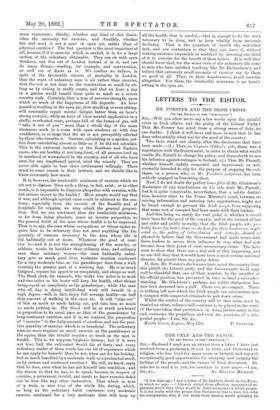LETTERS TO THE EDITOR.
MR. FORSTER AND THE IRISH CRISIS.
[TO THE EDITOR OF THE " SPECTATOR,"]
SIR,—Will you allow me to say a few words upon the painful crisis in Irish affairs, and the policy of the Liberal Party P That Mr. Forster has acted from a strong sense of duty, no one doubts. I think it will more and more be seen that he has done substantially what was for the good of the country.
Two facts stand out clearly, after the disclosures that have been made :—(1.) That, on Captain O'Shea's side, there was a negotiation with the Government, in order to obtain what would enable Mr. Parnell to change his policy, and thenceforth to use his influence against outrages in Ireland. (2.) That Mr. Parnell, whether himself rightly suspected and imprisoned, or not, avowedly intended to rely for the purpose of stopping the out- rages, on a person who, in Mr. Forster's judgment, has been actively engaged in fomenting them.
Now, I do not doubt the perfect bona fides of Mr. Gladstone's disclaimer of any negotiations on his side with Mr. Parnell ; but it is quite conceivable, nevertheless, that a subtle distinc- tion, however clear to the Prime Minister's mind, between re- ceiving information and entering into negotiations, might not be broad enough to prevent the Irish people from supposing that some sort of compact had been made with their leaders.
And this being so, surely the real point is, whether it would have been for the good of the country, and in the interest of law and order and public morality, that the Irish people, who pro- bably know far better than we do how far their leaders are impli- cated in the policy of intimidation and outrage, should be allowed to believe that the Government had made terms with those leaders to secure their influence to stop what had now become, from their point of view, unnecessary crime. The facts seem to show that there was a real risk of this happening, and no one will deny that it would have been a most serious national disaster, far greater than any party defeat.
If, then, Mr. Forster's disclosures have saved the country from this pitfall, the Liberal party and the Government itself may well be thankful that one of their number, by the sacrifice of his official position, has prevented in time so fatal a misunder- standing. Mr. Gladstone's perhaps too subtle distinction has now been deepened into a gulf. There was no compact. There is nothing left now which the Irish people can misconstrue into a compact with suspected criminals to put down crime.
Whilst the verdict of the country will be that crime must be treated as crime, reliance will continue to be placed in the truth of the conviction that persistence in doing justice must, in the end, overcome the prejudices, and even the passions, of a mis- guided people.—I am, Sir, &c.,
Knolls Green, Leyton, May 17th. F. SEEBOIIN.
































 Previous page
Previous page